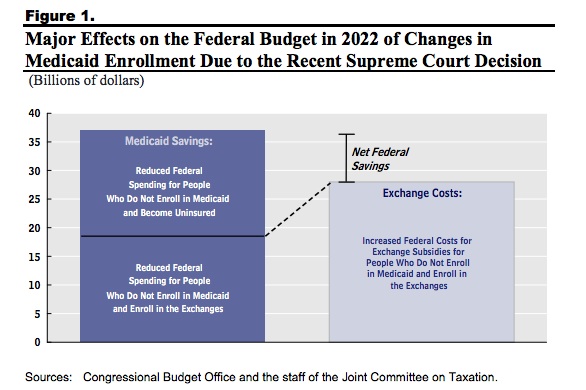Health News
CBO estimates court ruling will mean 3 million fewer people than predicted will get insurance, saving federal government $84 billion
The Congressional Budget Office estimates 3 million fewer people will get health insurance than expected before the U.S. Supreme Court's decision on the Patient Protection and Affordable Care Act. The CBO forecasts that will reduce the law's estimated cost by $84 billion over the next 10 years.
Fewer people will have coverage because some states will opt not to expand their Medicaid programs up to 138 percent the federal poverty level ? an option states now have because of the decision. This runs counter to a report by the conservative American Action Forum that predicted states declining to expand Medicaid would increase the law's cost.
Sarah Kliff of The Washington Post breaks down the nonpartisan congressional agency's calculation: "The CBO estimates that for every person who does not enroll in Medicaid, and because of that goes uninsured, the federal government saves $6,000 in spending by 2022. For the average person who does not enroll in Medicaid, but instead gets subsidized coverage from the health-insurance exchange, the federal government spends $9,000 ? $3,000 more than they would have had those individuals been on Medicaid."
Thus, the CBO says it will be more expensive for taxpayers if more people are on Medicaid instead of getting their insurance from the exchanges. With about 6 million fewer people than expected on Medicaid, and only about 3 million signing up for insurance exchanges, leaving 3 million more uninsured than expected, "The projected decrease in total federal spending on Medicaid is larger than the anticipated increase in total exchange subsidies," the CBO notes. Here is its graphic representation:

Fewer people will have coverage because some states will opt not to expand their Medicaid programs up to 138 percent the federal poverty level ? an option states now have because of the decision. This runs counter to a report by the conservative American Action Forum that predicted states declining to expand Medicaid would increase the law's cost.
Sarah Kliff of The Washington Post breaks down the nonpartisan congressional agency's calculation: "The CBO estimates that for every person who does not enroll in Medicaid, and because of that goes uninsured, the federal government saves $6,000 in spending by 2022. For the average person who does not enroll in Medicaid, but instead gets subsidized coverage from the health-insurance exchange, the federal government spends $9,000 ? $3,000 more than they would have had those individuals been on Medicaid."
Thus, the CBO says it will be more expensive for taxpayers if more people are on Medicaid instead of getting their insurance from the exchanges. With about 6 million fewer people than expected on Medicaid, and only about 3 million signing up for insurance exchanges, leaving 3 million more uninsured than expected, "The projected decrease in total federal spending on Medicaid is larger than the anticipated increase in total exchange subsidies," the CBO notes. Here is its graphic representation:

- State Won't Estimate Cost Of Greater-than-expected Medicaid Expansion For 'a Few Additional Months' ? After Nov. Election
By Al Cross Kentucky Health News The Republican-controlled state Senate's budget committee chair wants to know how much Democratic Gov. Steve Beshear's expansion of the Medicaid program will cost, since enrollment in the federal-state program...
- Expanding Medicaid Will Save The State Money By Eliminating Much Expense On The Uninsured, Think Tank And Op-ed Writer Argue
If Kentucky chooses to expand Medicaid eligibility up to 133 percent of the federal poverty level, the state will gain in key areas, argues Jason Bailey, director of the Kentucky Center for Economic Policy, right, in an op-ed piece in the Lexington Herald-Leader....
- Experts Disagree On Whether States Will Choose To Expand Medicaid
Experts disagree on whether states will choose to expand Medicaid, a crucial, but voluntary, part of the federal health-care reform law. Yesterday, the Supreme Court ruled the federal government could not force states to expand the system for the poor...
- Conflicting Interpretations Abound Regarding Cbo's Report About Cost, Coverage Of Affordable Care Act
By Tara Kaprowy Kentucky Health News Since the Congressional Budget Office released a report with revised estimates about how many people the Affordable Care Act will cover and how much it will cost, it has spawned a whirlwind of op-ed pieces with vastly...
- Five Myths About The Medicaid Expansion
The Supreme Court's June 2012 Affordable Care Act ruling was decisive about the implications of the individual mandate; however, it was less decisive about the ACA's Medicaid expansion. The court gave flexibility to each state to decide whether...
